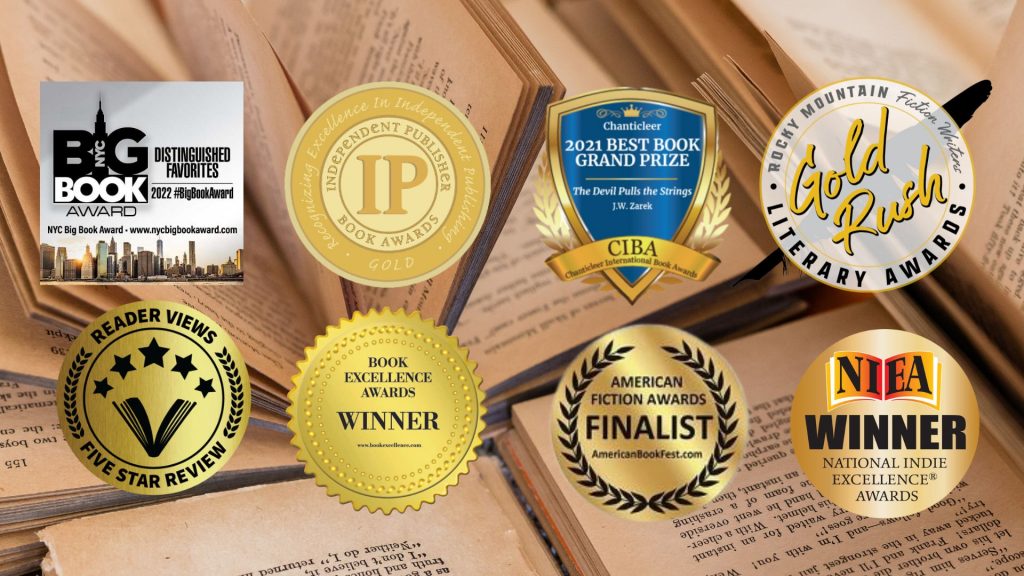Writing Contests – Good Idea or Waste of Money?

During a podcast interview last week, my guest remarked that, though she’d won two prestigious awards for her women’s fiction debut, she wasn’t sure she’d enter any competitions for her next book. Since most awards charge a fee of between $50-$150 per category, she questioned whether that was a wise use of money. And there’s also the feeling that one book is so different than another, so isn’t it a fool’s errand to judge which one is best?
Her remark got me thinking, since I’d entered some of the same contests myself. What was the upside of being a finalist, or even a winner? Did it translate into sales or was it just a way to boost a writer’s self-image?
Whether it’s the IRDA Discovery Awards, the Reader’s Favorite, the Sarton Award, the Nautilus Award, IBPA’s Ben Franklins, or Shelf Unbound Best Indie, (not to mention the really famous ones like the Booker and the Pulitzer and association ones like the RMFW’s Gold Rush and the WFWA Star Award) are there legitimate reasons why an author launching a new book might choose to enter a writing competition?
Putting aside ego, here are a few:
Discoverability
Like any author, your first hurdle Is to raise awareness of your book. Your novel needs to find a way to stand out in the sea of new releases occurring every year. One way to do that is for an independent judge (s) to single out your book from hundreds of entries and designate it a winner. Most contests strive to have as many winners as possible, announcing not only gold, silver, and bronze levels but also runners-up or honorable mention or distinguished favorites. Each comes with a sticker and a JPEG image to use in marketing. By utilizing these symbols of recognition, you make your book stand out from the crowd which any good PR person will tell you is the first step to a sale.
Legitimacy
Despite the progress made in the last five years in gaining acceptance for the quality of writing coming out of the indie and small press worlds, there is still a tendency to think of anything not published by the traditional Big Five as “less than.” Not so much from readers (who frankly couldn’t tell you who published a book if their life depended on it) but from other authors and industry professionals like agents and publishers. By winning a prestigious award and mentioning that fact in your bio, you gain status with these gatekeepers as they scan your query letter or evaluate your submitted pages. Again, it’s a matter of raising yourself up from the crowd based on an outsider judging your book as “best among the lot.”
Networking and publicity
Any time your book is singled out for praise, you can legitimately shout about it on social media and it won’t feel gratuitous. It’s actual news, and a perfect opportunity to once again familiarize readers with your book. Likewise, you can introduce yourself to fellow category winners, send the notice to local media, use in your press kit to stand out with bookstores and librarians, and use as clout when submitting proposals for author appearances. If there is an awards ceremony, you’ll get the opportunity to hobnob with other winners and well-connected members of the writing community. Several authors I know have met their agents or publishers at such events.
Additional Benefits
Contests vary widely in terms of “soft” compensation. In addition to the prestige of winning and often a physical trophy, you may receive a cash award, a free critique of your work, a prominent book review, a paid residency, or even an offer to publish. You may attract the attention of foreign distributors or film/TV producers or be offered a chance for speaking engagements which carry a stipend.
And finally, the “feels”
I freely admit that winning an award is an endorphin rush. When I open the email that says “congratulations”, a warm feeling floods my body. When I announce the win on Facebook, I smile when my writer pals chime in with their congratulations. And what’s wrong with that?
Absolutely nothing. In fact, there have been times when I’ve doubted my talent (usually after reading a poor review on GoodReads) and had to stop and remind myself I’d won several big competitions so somebody with strong writing credentials thinks my book is excellent. Likewise, when I read the rough draft of my WIP and wonder how I ever thought I could make it as a writer, I tell myself my debut was selected by the Woman’s National Book Association as a 2022 Great Group Read. I’ve made a graphic on Canva showing my book surrounded by all the awards I’ve garnered to combat any imposter syndrome that tries to sneak in my door. So yes, stroking your own ego by winning awards is not something to be ashamed of.
It’s something to cherish.
Hey, this writing gig is hard enough as it is. I’ll take a pat on the back any day. Add in a gold ring or even just a sticker and I’m in.